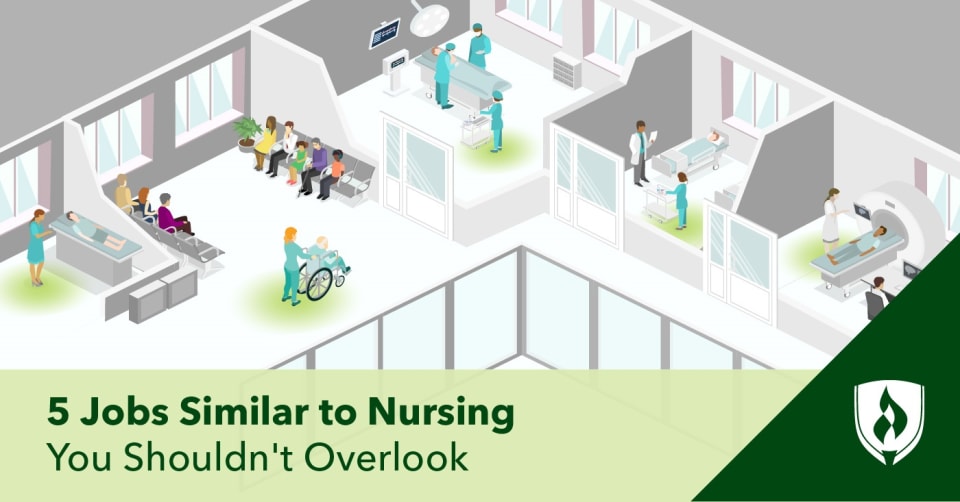
In 2020, the importance of the medical community came into view in a way most of us have never seen in our lifetimes. Across the nightly news and social media feeds were images of medical personnel risking their lives to save others during a pandemic. While this has inspired many, few are at a stage in life where they can spend the better part of a decade pursuing an MD.
Nursing may immediately be the next healthcare profession that comes to mind, but it is not the only career opportunity available in this vital field. While the details and differences are important, the healthcare field is home to many jobs similar to nursing. If you are interested in nursing, don’t overlook some of these other options just yet—you might find the career in healthcare you’ve been hoping for.
5 Jobs similar to nursing to keep on your radar
1. Medical assistant
Medical assistants work directly under a licensed doctor or registered nurse by assisting with patients or by doing clerical work around the facility. Whether it is collecting a patient's health history, measuring vitals, or setting and confirming appointments, medical assistants spend most of their days interacting with patients.
How it’s similar to nursing: Medical assistants are often the first face patients see after entering an office or hospital. The friendliness, compassion and competence of a medical assistant can make or break a patient’s visit. Like nurses, these healthcare professionals can also measure vital signs, record patient data and gather information on medical history.
Medical assistants may also administer injections or take swabs for testing depending on the medical licensing standards in their state.
How to become a medical assistant: While medical assistants don’t yet have standardized education requirements, most will complete a comparatively short postsecondary training program like the Medical Assisting Diploma program at Rasmussen University. These programs focus on developing the essential patient care and administrative skills medical assistants need on the job.
2. Radiologic technologist
Also known as radiographers, radiologic technologists perform X-rays and other diagnostic-imaging examinations on patients. They work closely with radiologists and physicians in any type of medical facility that performs X-rays, with opportunities for specific specialization in different types of diagnostic-imaging technology, like CT scans, mammography and MRIs.
How it’s similar to nursing: Like nurses, radiologic technologists work directly with physicians to help determine the proper diagnosis. Their attention to detail and precision with technology is critical to catch problems and get an accurate view of what is happening inside each patient. With a focus on operating computerized equipment, this could be a great career choice for anyone who prefers the technical/diagnostic aspects of healthcare with a little less patient interaction.
How to become a radiologic technologist: Radiologic technologists usually need an Associate’s degree. Many states also require radiologic technologists to get certified.
3. Physical therapist assistant
Physical therapist assistants (PTAs) work under the supervision of physical therapists to help patients who are recovering from injury or illness regain mobility or manage pain. This career requires compassionate interaction with patients who are working to improve injury, illness or disability.
How it’s similar to nursing: Observing patient mood, movements and speech is essential for PTAs and nurses alike. PTAs work with physical therapy teams to develop and follow a treatment plan for each patient. While diagnoses can get a lot of the attention in the medical field, the long road to recovery is just as vital. This is where the physical therapy team shines. Like nurses, PTAs need to have empathy balanced with the conviction to stick to a treatment plan that will best serve the patient.
How to become a physical therapist assistant: To become a PTA, you will need to complete an Associate’s degree program. In most states, after graduation you’ll need to pass the National Physical Therapy Exam (NPTE®) to obtain licensure as well.
4. Surgical technologist
Also known as operating room technicians, surgical technologists help prepare the operating room by organizing and arranging surgical equipment and assisting the surgeon during operation. Through preparing, assisting and cleaning up post-op, a surgical tech ensures that every surgery is as sterile and safe as possible.
How it’s similar to nursing: “Nurse, scalpel!” If you have ever watched an old-school dramatization of a surgery, there’s a good chance you’ve heard this outdated depiction of operating room procedure, which ignores the distinctions between the professionals in a surgical team. Surgical technologists are the equipment specialists of the group who ensure sterilization, organization and the transfer of surgical equipment.
While this role is fairly different from a nurse on paper, it does involve preparing patients for surgery and, especially, preparing and maintaining the operating environment. This career puts you in the heart of the operating room, with (perhaps) a little less stress.
How to become a surgical tech: Surgical technologists need a diploma, certificate or Associate's degree. Additionally, some states and employers may require prospective surgical technologists to obtain certification before they can practice.
5. Nursing assistant
Also known as nursing aides or orderlies, certified nursing assistants (CNAs) work with patients to help out with all of their daily needs. Cleaning, measuring vitals and assisting patients during mealtimes are all central duties of a nursing assistant.
How it’s similar to nursing: Nursing assistants perform many of the same interpersonal tasks that nurses perform and are often first in line in terms of patient care. While the majority of registered nurses work in hospitals, the majority of nursing assistants work in nursing or long-term care facilities. Because of this, many CNAs have the opportunity to build longer-term relationships with their patients.
How to become a nursing assistant: To become a nursing assistant, you will need a high school diploma (or equivalent) paired with completion of a state-approved education program. These programs usually take about 4–12 weeks and culminate in an exam you must pass to receive certification. Since healthcare hopefuls can become a nursing assistant quickly, this career makes a great option for anyone who wants to build patient care experience and start working in healthcare as fast as possible.
Want to work in healthcare?
Many assume that jobs similar to nursing are only for people who have the time and resources for completing a Bachelor’s degree program. But healthcare is full of varied career choices that can attract people from all across the board. The healthcare field needs skilled people who are eager to make a positive difference in patient outcomes.
If you are passionate about helping others, you are already partway there. Working in healthcare is truly a whole different world than other industries. Check out “7 Compelling Reasons to Consider Working in the Healthcare Industry” to see if working in this industry would meet your needs in a future career.
Related Articles:
National Physical Therapy Exam is a registered trademark of the Federation of State Boards of Physical Therapy, Inc.




